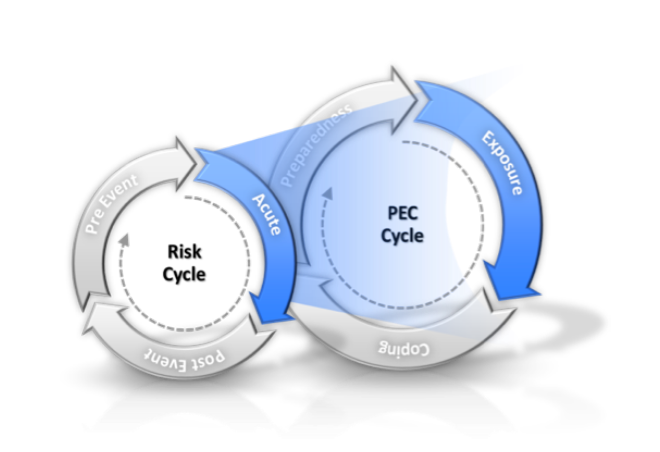About us

People all over the world are exposed to many health risks in the form of communicable or non-communicable diseases, injury, violence, or natural catastrophe. To date, the major global risks for mortality are often directly or indirectly related to individual decisions and behaviors. Advancing the understanding of risk perception and its consequences for preventive behavior is therefore highly important, particularly in societies which increasingly expect individuals to take responsibility for their health-related behaviors.
Even though commonly faced hazards and risks in modern societies wax and wane with time, most existing risk perception research is cross-sectional. The present Research Unit "Riskdynamics" aims to close the gap between the dynamic nature of risk perception in real-life settings and the static view applied in previous research. Accordingly, a systematic research program is proposed to examine the dynamic nature of risk perception and its relation to precautionary behavior across time in the context of mental and physical health, with the long-term goal of advancing and specifying theories on risk perception and health behavior changes to better inform and design effective public health promotion.
The Research Unit brings researchers from different fields of psychology together in a joint effort to develop an integrative, data-driven understanding of the stability and dynamic change of risk perceptions from a risk cycle perspective by distinguishing between pre-event, acute, and post-event phases of critical, risk-relevant events ranging from repeated micro-events, such as risky choices in experimental contexts, to macro-events, such as infectious disease epidemics at a global scale. Moreover, the proposed Research Unit will examine risk perception as it changes in dependence of Preparedness (e.g., dispositions, expectancies), Exposure to critical, risk-related events, and Coping with the exposure (e.g., behavior change). The study of Preparedness-Exposure-Coping (PEC) Cycles promises novel insights into the mechanisms and interplay of dynamic change in risk perception and precautionary behavior.
To capture the dynamic nature of risk perceptions and precautionary behaviors, novel methodological approaches and study designs are used in six interconnected research projects. Specifically, the projects will investigate risk perception and PEC Cycle dynamics in response to emerging and reemerging health risks using data from real and virtual social networks (P1 ‘Contagious Risk Perception’, Gaissmaier), by realizing a newly developed virtual dating website (P2 ‘Social Contact Risk’, Schupp & Renner), and by using dynamic risk tasks to study the dynamics of risk perception and behavior (P4 ‘Updating Risk’, Gollwitzer; P5 ‘Cumulative Risk’, Hübner; P6 ‘Addiction Risk’, Odenwald & Rockstroh). Furthermore, several projects will study the dynamics of risk perceptions and PEC Cycles in real-life contexts by providing multiple, personalized feedback about the actual health risk status based on biomarkers and the actual lifestyle (P3 ‘Personalized Risk’, Renner; P4 ‘Updating Risk’, Gollwitzer; P6 ‘Addiction Risk; Odenwald & Rockstroh; A1 ‘Trauma Risk’, Elbert & Schauer).
Overall, the present Research Unit seeks to contribute to a better understanding of the question, ‘How can we induce people to look after their health?’, which, in a recent social science survey conducted by the US National Science Foundation, has been ranked as the most challenging contemporary issue. Novel data and findings will help to advance and specify theories on risk perception and are indispensable for designing effective risk communication and novel ways to facilitate adaptive behavior changes.
Scientific Advisory Board
A group of internationally recognized experts in risk research covering a broad area of expertise form the Scientific Advisory Board. The Advisory Board will hold annual meetings to provide the Research Unit with general strategic advice on the planning and implementation of research activities and also contributes to promoting and training the young researchers. The members of the Advisory Board are:
1. Prof. Dr. Elke Weber, Columbia University, USA
2. Prof. Dr. Gerd Gigerenzer, MPI for Human Development, D
3. Prof. Dr. Hein de Vries, Maastricht University, NL
4. Prof. Dr. Theresa Marteau, Cambridge University, UK
5. Prof. Dr. Emily Falk, University of Pennsylvania, USA
